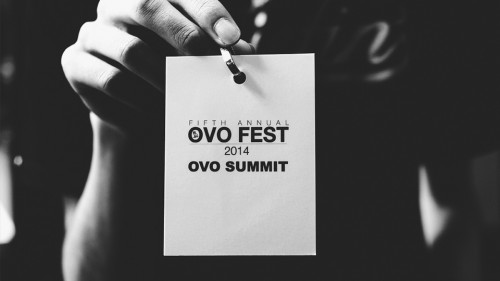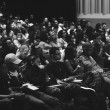Something interesting comes over people when they see government dollar signs associated with someone wealthy; resentment enters fray and the thoughts of well-off hands slipping into half empty pockets are felt more emotionally than physically. This knee jerk reaction played into the minds of a subset of Toronto residents when news slipped out that the Canadian government would be handing over $300,000 to OVO Fest, an event made synonymous with super star personage and fan catered spectacles. Being someone on the outside looking in, I personally didn’t know what to feel, but at face value, I had an inclination to side with the eye rollers who viewed the two-night concert as an event decorated with gold fountains of profit; why would it need government help? Those same feelings, however, began to become clouded when I found myself sitting within a large auditorium at CBC’s Glen Gould Studios, pen and paper in hand, at the invite-only, OVO Summit.
There was a strange level of underground secrecy to the whole thing. Phones had to be turned off, recording was strictly forbidden and direct interviews with panelists was not allowed. You’d think that with the negative reaction, the people behind the event, aimed at providing valuable knowledge to a selection of youth, would want it to be commercialized. But yet, here I was, sitting amongst a group of fledgling artists who all had an excited level of energy to them. Some brandishing fitted caps with hometown spellings like Scarborough, all presenting themselves in manners of style, which exemplified Toronto’s well-known diversity. Straight from the jump, the lack of care about advertising the event made it apparent that this was far from a PR driven event aimed at improving public opinion, this was about improving a generation.
The sessions danced around subjects any young artist within any musical capacity would want to know, from brand management, music publishing and artist development. Echoed names like Bryan Brock, Bryan Espiritu, Vivian Barclay, Future the Prince, Aisha Wickham and Noah “40” Shebib, among others, had the young guests nodding and laughing from a shared enthusiasm and understanding of the lingo that paints the industry green. As a journalist, I was out of my element as I sat beside industry heads who remained huddled in the back behind the humbled audience that the panelists came to speak to, but I felt no less a part of the beginnings of something fruitful.
Tidbits of knowledge like the cold hard facts of there being no road map to success were expressed and the differences between a songwriter and a performer were examined. I watched as young viewers absorbed and pondered on questions like if they could handle the industry mentally, whether or not they could actually bring something different to the table and on the importance of originality in sound. Myself being an outsider to the world of performing music, I had the advantage of being an objective observer and what I saw was a hopeful representation of where the mindset of urban music is in relation to the north. Opinions were expressed without filter and un-asked questions were answered in relation to what it took to generate the collection of artists, technical heads and directors needed to operate an event on the scale of OVO Fest.
Canada has been a nation that often plays second to its southern brethren and the temptation to bring the festival to the United States has been a lure by American voices who question the placement of the program. As quoted by a source I’m not allowed to mention, “It takes a million to sell a million,” and Canada’s funding system is second to none. The minds behind OVO Fest and Summit want the brand to stay in Canada and judging by the changed young minds I witnessed, it needs to remain lucrative to the greater benefit of a stream of new artists who want to make a name on homegrown soil. They have to believe that our government will support them through their journey and be removed of the temptation to exit stage left.
Could the festival have survived without the $300,000 dollar figure? Possibly, but this is more about the image of support the government has for artists within Toronto than its face valued impact. If what I witnessed at the summit was meant to send a message to those who feel that their pockets are being emptied by a glorified concert, it’s this — the foundation is being built, our brand as a nation of music is getting stronger, and the young will have a place to stand tall as artists in this country without having to look elsewhere.
Words By. Noel Ransome + Photos Courtesy of. Anil Hanasoge/Hansel Alonzo
















Comments are closed.